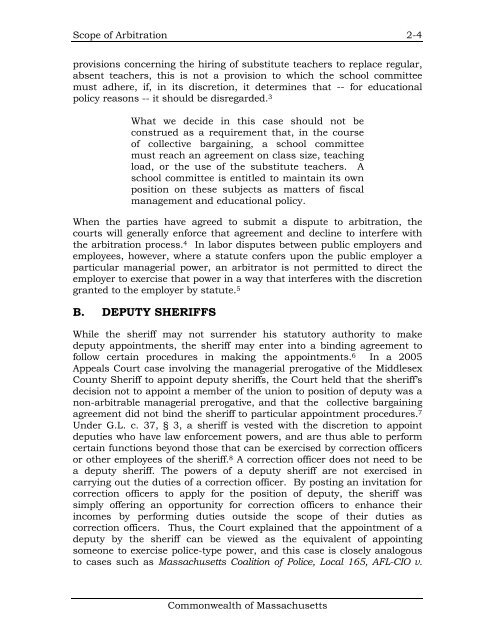Management Rights - AELE's Home Page
Management Rights - AELE's Home Page
Management Rights - AELE's Home Page
Create successful ePaper yourself
Turn your PDF publications into a flip-book with our unique Google optimized e-Paper software.
Scope of Arbitration 2-4<br />
provisions concerning the hiring of substitute teachers to replace regular,<br />
absent teachers, this is not a provision to which the school committee<br />
must adhere, if, in its discretion, it determines that -- for educational<br />
policy reasons -- it should be disregarded. 3<br />
What we decide in this case should not be<br />
construed as a requirement that, in the course<br />
of collective bargaining, a school committee<br />
must reach an agreement on class size, teaching<br />
load, or the use of the substitute teachers. A<br />
school committee is entitled to maintain its own<br />
position on these subjects as matters of fiscal<br />
management and educational policy.<br />
When the parties have agreed to submit a dispute to arbitration, the<br />
courts will generally enforce that agreement and decline to interfere with<br />
the arbitration process. 4 In labor disputes between public employers and<br />
employees, however, where a statute confers upon the public employer a<br />
particular managerial power, an arbitrator is not permitted to direct the<br />
employer to exercise that power in a way that interferes with the discretion<br />
granted to the employer by statute. 5<br />
B. DEPUTY SHERIFFS<br />
While the sheriff may not surrender his statutory authority to make<br />
deputy appointments, the sheriff may enter into a binding agreement to<br />
follow certain procedures in making the appointments. 6 In a 2005<br />
Appeals Court case involving the managerial prerogative of the Middlesex<br />
CountySherif to appoint deputy sherifs, the Court held that the sherif’s<br />
decision not to appoint a member of the union to position of deputy was a<br />
non-arbitrable managerial prerogative, and that the collective bargaining<br />
agreement did not bind the sheriff to particular appointment procedures. 7<br />
Under G.L. c. 37, § 3, a sheriff is vested with the discretion to appoint<br />
deputies who have law enforcement powers, and are thus able to perform<br />
certain functions beyond those that can be exercised by correction officers<br />
or other employees of the sheriff. 8 A correction officer does not need to be<br />
a deputy sheriff. The powers of a deputy sheriff are not exercised in<br />
carrying out the duties of a correction officer. By posting an invitation for<br />
correction officers to apply for the position of deputy, the sheriff was<br />
simply offering an opportunity for correction officers to enhance their<br />
incomes by performing duties outside the scope of their duties as<br />
correction officers. Thus, the Court explained that the appointment of a<br />
deputy by the sheriff can be viewed as the equivalent of appointing<br />
someone to exercise police-type power, and this case is closely analogous<br />
to cases such as Massachusetts Coalition of Police, Local 165, AFL-CIO v.<br />
Commonwealth of Massachusetts
















